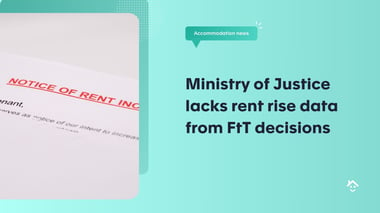Landlords are expressing their growing fears over a tenant's right to keep a pet as part of the Renters (Reform) Bill, research reveals.
The survey by Leaders Romans Group (LRG) found that 56% of landlords are anticipating a negative impact because of the Bill's stance on pet ownership in rental properties.
This concern even surpasses the potential effects of abolishing Section 21 'no-fault' evictions - highlighting the scale of the pet policy issue within the private rented sector (PRS).
Unsurprisingly, tenants appear less concerned about pet ownership as 68% did not request to keep a pet during their last move because they did not own one.
However, 18% asked their landlord and were accepted, while 9% faced difficulties but eventually found somewhere to rent.
Only 2% of tenants were unable to get a pet due to difficulties.
'Pet-friendly policies in rental agreements'
LRG's group director of property management, Kim Lidbury, said: "The introduction of pet-friendly policies in rental agreements is a nuanced issue that requires careful consideration to balance the interests of tenants with those of landlords.
"Not all property types may be suitable for pets, for instance, flats within blocks and properties without gardens.
"The Third Reading of the Bill recently included a mandate that tenants either maintain insurance to cover potential pet damage or compensate the landlord for the reasonable cost of obtaining such insurance."
She added: "This is a positive step forward which does seem to address landlords' concerns while also enhancing the lives of tenants and their pets.
"However more detail is still required to ensure that pets can only be requested in an appropriate property."
Request permission to keep pets
The Renters (Reform) Bill is proposing a big change with the provisions for tenants to request permission from their landlords to keep pets.
These changes, the Government says, aim to offer more stability and security for tenants but there are still questions about the impact on landlords and property management.
One of the issues is that landlords won't be able to ban a pet from the rented property.
Instead, a tenant will have the right to ask for permission from a landlord to have a pet in their home.
And the landlord will not be able to 'unreasonably' refuse a tenant's request.
Bring 'pet-friendly' renting closer for tenants
Before a debate on the Bill last Autumn, Cats Protection said it was 'delighted' by the prospect as this would bring 'pet-friendly' renting closer for tenants.
A spokeswoman said: "This bill has the potential to finally give tenants the right to request to own a pet, safe in the knowledge that their request cannot be unreasonably refused."
And the Dogs Trust, which has welcomed the Bill, said that allowing pets was 'great news for pet owners who rent'.
Recent research from LendingTree found that 61% of renters said landlords should accept pets as standard.
The National Residential Landlords Association (NRLA) says there needs to be 'comprehensive guidance' on when a landlord can refuse a pet, so they aren't afraid of court action.
The Department for Levelling Up, Housing and Communities committee has reported that landlords can refuse a pet request if the animal is 'too large for a small property' or if a tenant has a pet allergy.
However, the Renters Reform Coalition says tenants must be allowed to keep a pet - regardless of what their landlord thinks.
'Still a lot of unanswered questions'
Simon Thompson, the managing director of Accommodation for Students, said: "As it stands, there are still a lot of unanswered questions.
"While the new law may state landlords be compensated or tenants get insurance - how would landlords know?
"How can they check if a tenant shows proof of the pet insurance policy before cancelling it?"
He added: "Lots of landlords will not want this part of the Bill to go forward because they will fear the repair costs after a tenant with pets leaves.
"And there's the worry of what happens if they decline a tenant's request for a pet - more work needs to be done and politicians need to be realistic about the concerns landlords have on this issue."




